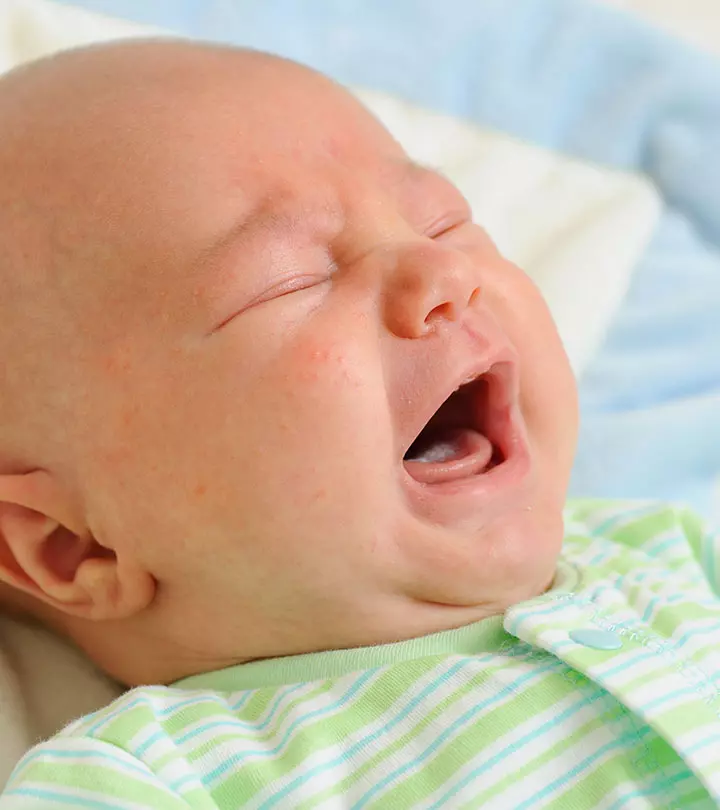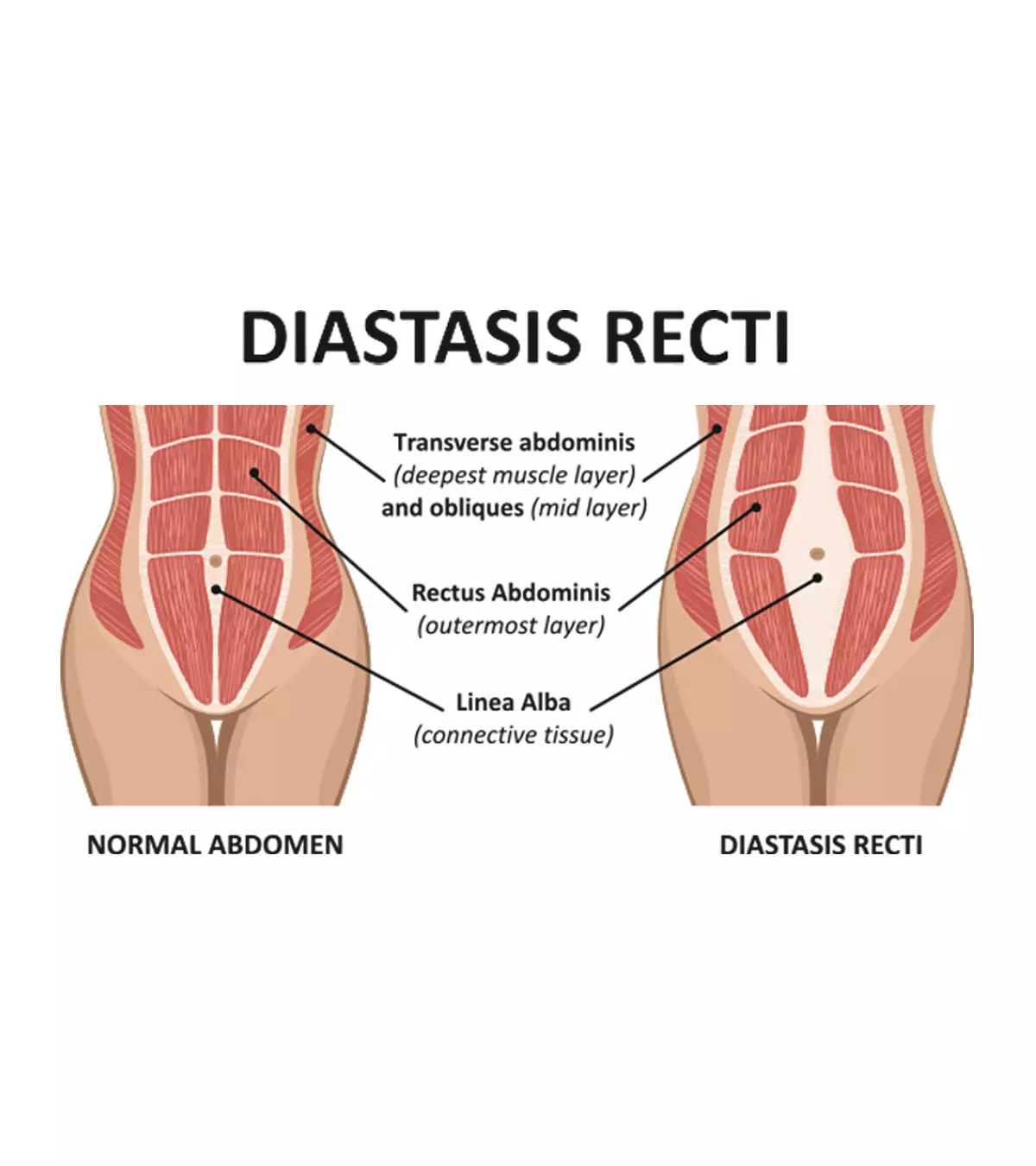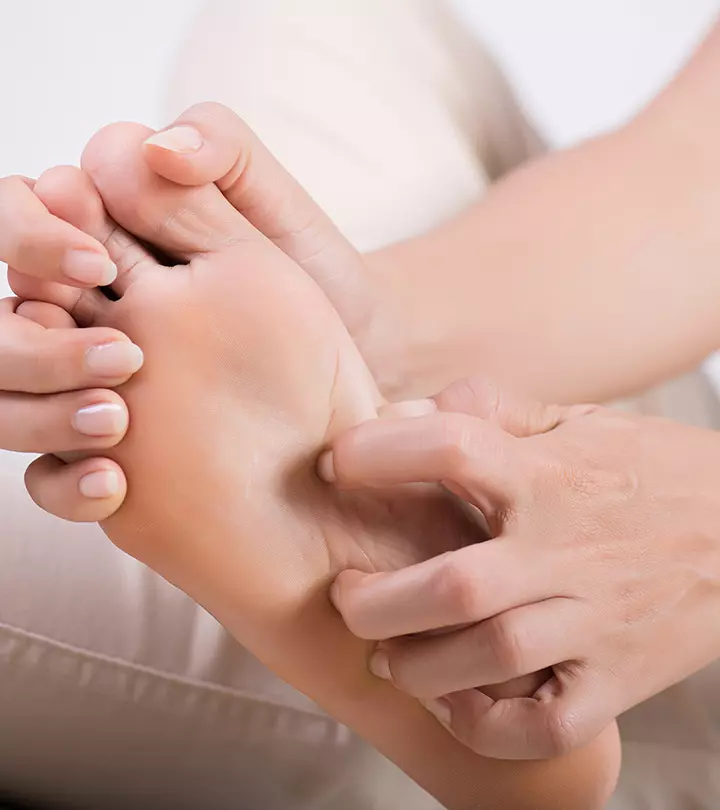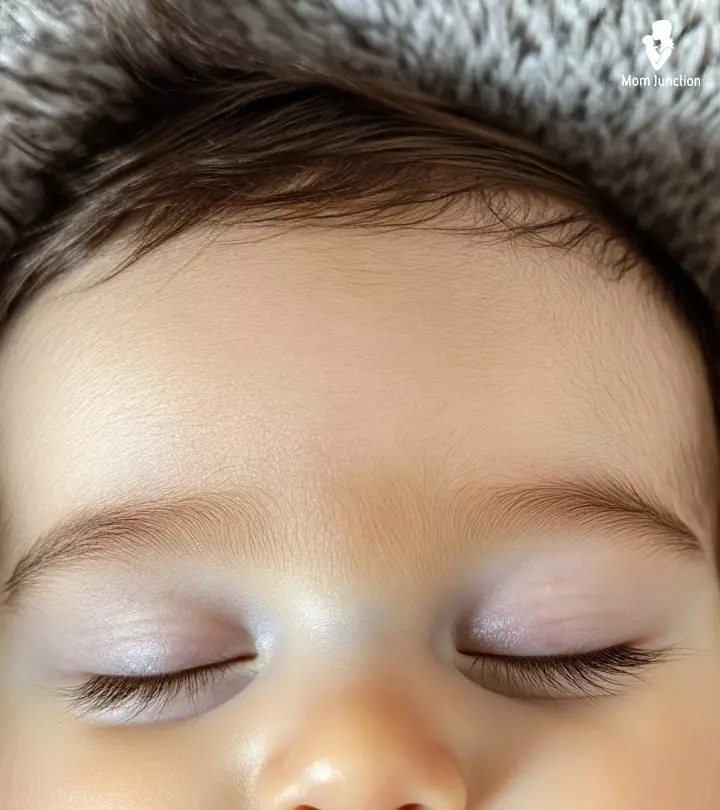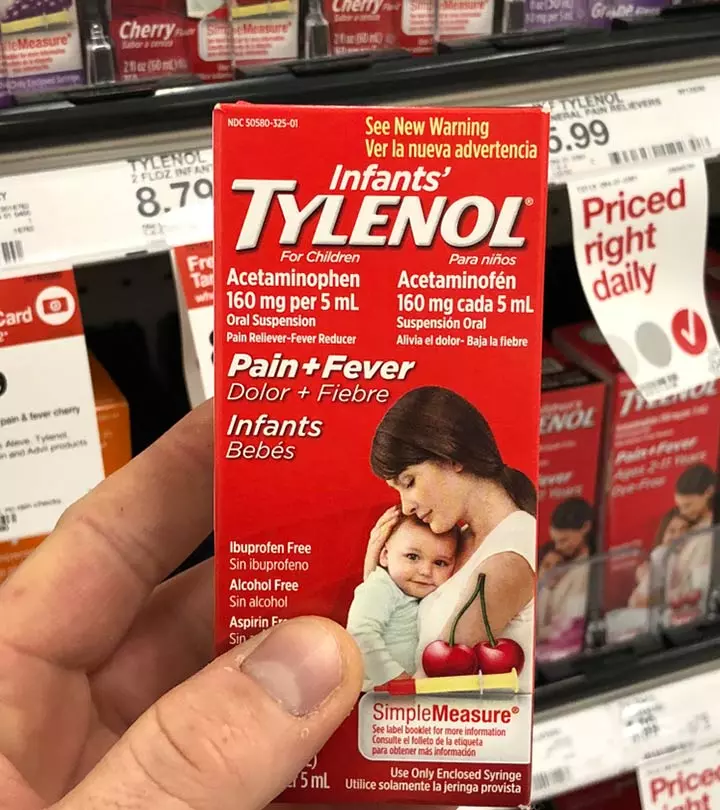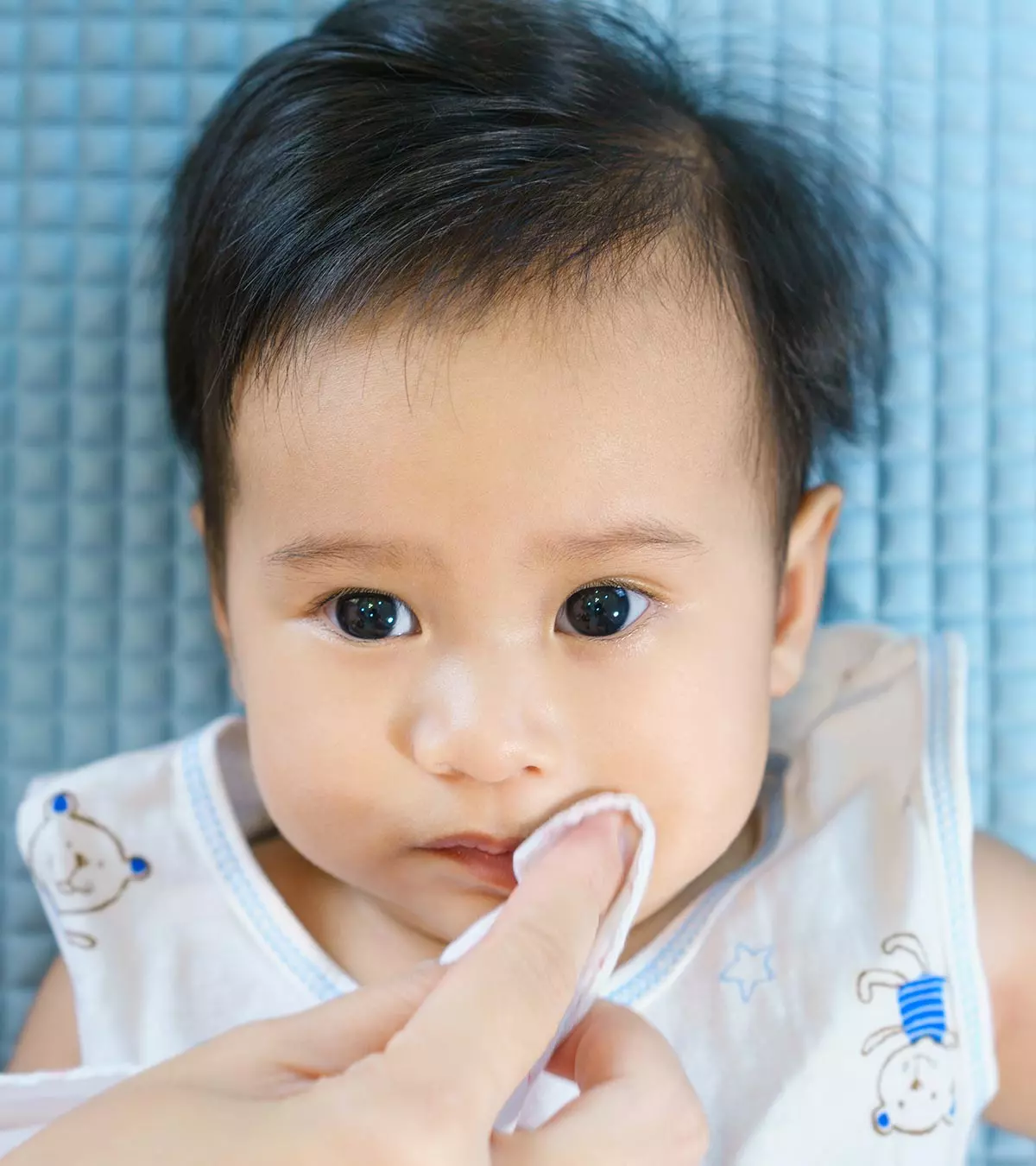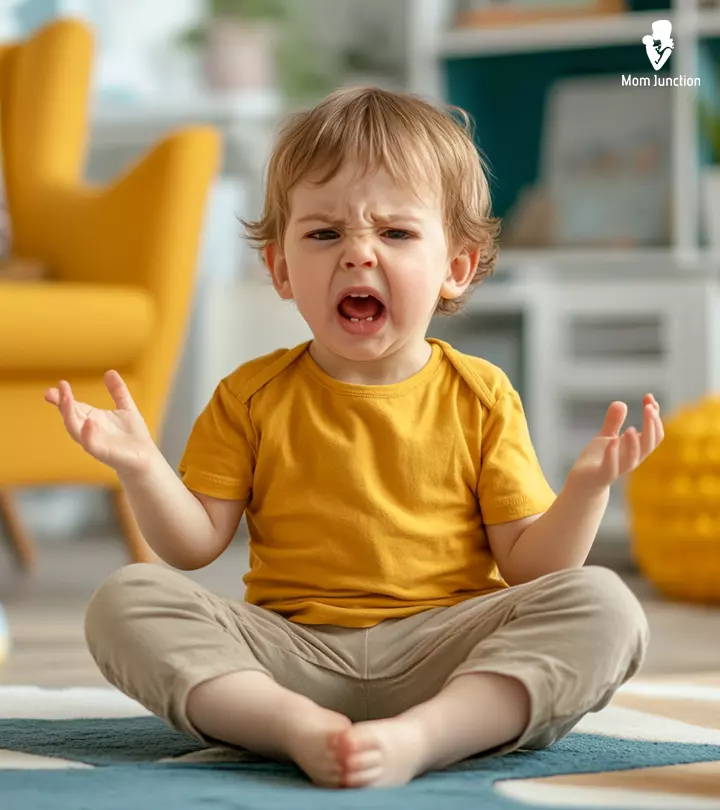
Image: Midjourney/ MomJunction Design Team
One of the behaviors that send a parent down a panic lane is when they observe their toddlers hitting themselves and banging their heads, inflicting self-injures. But why do toddlers hit themselves?

As scary as it may seem, this type of behavior is a part of their developmental phase; take it as a way your child expresses their emotions. Mostly, you may notice that your toddler attempts such acts when they are angry or in need of attention.
According to Maria Pistorio, LPC, NCC, PCIT, a Philadelphia-based therapist specializing in EMDR, CBT therapy, and parent-child interaction therapy, “The behavior could mirror the way she/he is feeling inside. But toddlers are too limited in vocabulary to explain feeling overwhelmed, angry, or lonely.”
This child behavior is termed self-injurious behavior (SIB). Studies have indicated that 15% of young children exhibit SIB during their early years(1). But sometimes, persistent and chronic SIB may lead to developmental delays.
Read on to learn more about SIB, its causes, and when it must be reported to a physician. While this article provides valuable insights, it should not be considered a substitute for professional advice. Consulting a qualified expert is essential if your child exhibits self-injurious behavior.
Key Pointers
- Being alone, frustrated, tired, or angry can make a toddler hit themself.
- Identifying and treating the underlying cause and comforting can help the toddler stop this self-injurious behavior.
- You may ensure the safety of toddlers who tend to hit themselves by keeping away dangerous objects from their reach.
Why Do Toddlers Hit Themselves?
During toddlerhood, your child will be aware of their surroundings and start exploring the world around them. They will also learn to communicate their wants and needs in different ways, such as pointing, crying, and throwing tantrums to self-harm. Pediatrician Dr. Raashid Hamid explains, “Toddlers who engage in self-harm behaviors like hitting themselves are often struggling with emotional regulation. They lack the tools to manage big emotions, and self-harm becomes a physical outlet for their frustration or overwhelm. For some toddlers, self-hitting may be linked to sensory processing challenges, as they may be seeking proprioceptive input (deep pressure) to calm themselves.” Comprehending the reasons behind these behaviors is vital for parents, as it can impact their child’s emotional and developmental well-being. The following are the possible causes for such behaviors.
1. Frustration
Toddlers might not have the full capabilities to fulfill their own needs or verbally communicate their desires. These limitations and challenges in understanding the world may cause anger and frustration, resulting in hitting themselves. Researchers from the University of Toronto and the Centre for Addiction and Mental Health have found that children often exhibit such behavior when tired, alone, or upset. Infants are also known to bang their heads at bedtime (2).
Jo Boyne, a mother and blogger from Leeds, UK, faced the self-hitting issue with her daughter Elizabeth when she was a toddler. Sharing her experience, she says, “She (Elizabeth) cries to get attention, then listens. If we ignore her cries, she will try a different type of crying. We might give in or not. She may also bite to get attention. So, is this head hitting a new form of getting attention and being manipulative? At the moment, I am taking this as a sign of pure frustration that she cannot put into words how she is feeling (i).”
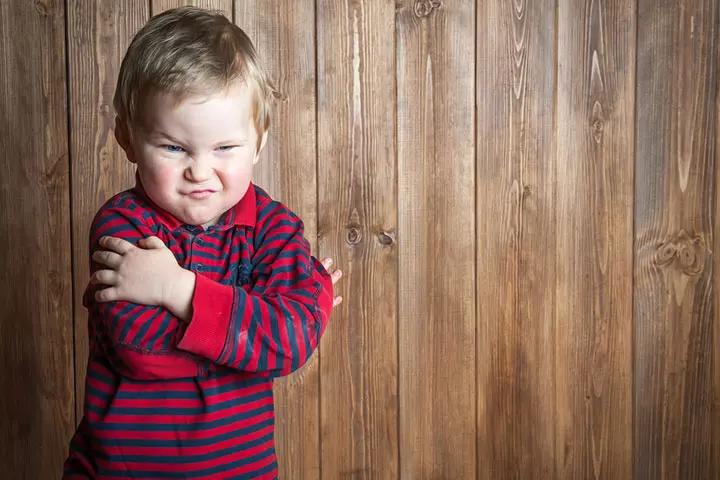
2. Excitement
Toddlers are naturally energetic, curious, and easily excitable. You may see a toddler screaming or a toddler throwing things when they are over-excited but have limited knowledge of how to express themselves. Thus, hitting or banging their heads may also come as exhibiting excitement. It may seem serious, but it is normal for toddlers to express strong emotions in different ways. These actions are similar to how adults clap hands or jump in excitement. Adults are well-versed with the standard ways to express excitement, while babies aren’t, so they do what they feel like. Board-certified diplomate of the Philippine Pediatric Society, Dr. Maria Carmela Villania-Mamauag, opines, “Toddlers have a lot of energy but quite a little vocabulary yet. This puts them in a situation where extreme or big emotions might saturate them, but they cannot voice them. Hence, in response to frustration, excitement, anger, etc., they tend to hit themselves or engage in self-injurious behaviours as outlets for these big emotions.”
3. Separation anxiety
Parents are a toddler’s haven. They find comfort in their presence and gain the courage to explore the world around them due to their intrinsic trust in their parents to offer protection. However, when they sense an approaching separation from their parents, toddlers tend to express their rejection in several ways, including self-harm. This may also be the case with other changes in their daily routine, as changes tend to feel threatening to the child’s comfort zone, causing anxiety. In such cases, toddlers soothe themselves in the only ways they know, by hair pulling or hitting themselves (3).
4. Attention seeking
Toddlers often learn what behaviors elicit what reaction from parents. This becomes especially true when parents pull the toddler back from doing almost anything they wish. This negative attention from parents may eventually become the toddler’s primary focus. As a result, they may use it as a way to constantly gain the parents’ attention (3).
Pistorio adds, “It is developmentally typical for toddlers to hit themselves. Developmentally, toddlers lack emotional regulation and look for anything to alleviate bad feelings. They may also use self-injurious behavior to get attention from parents. The behavior parents pay attention to is the behavior they see more.”
5. Pain relief
Toddlers are vulnerable to pain as an active part of their development. The pain may be from teething, infections, or injuries, which makes them grumpy or irritable. They are ill-equipped to communicate or deal with their pain and thus find other ways to distract themselves. Anecdotal evidence suggests that toddlers may hit themselves or bang their heads to get relief from pain. For instance, if your toddler hits one or both sides of their head or pulls their ears, it could be a sign of an ear infection, and if they hit and bite themselves, they might be experiencing teething pain.
Every behavior communicates something. Seeing your baby hit can be hard. It might become a habit if such behavior is not stopped early on. So, you need an action plan for managing toddler aggression and preventing episodes of deliberate self-harming.
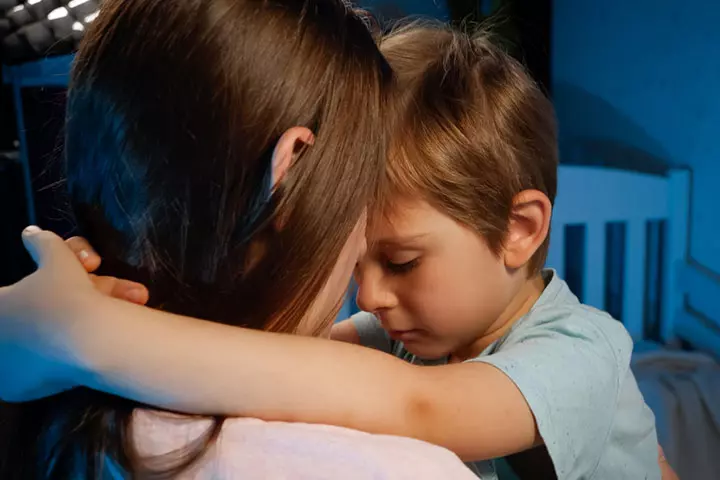
Seeing your baby hit themselves can be hard. If such behavior is not stopped early on, it might become a habit. So, you need an action plan for managing toddler aggression and preventing such episodes of deliberate self-harming.
 Be watchful
Be watchfulHow To Stop Your Toddler From Hitting Themselves?
Hitting, yelling, or scolding your toddler may not be an effective way for toddler discipline or prevent them from hitting themselves. It may at times have an opposite effect on what you desire and end up increasing their negative behavior. Here are a few ways to prevent injuries until your toddler learns safer ways of expressing their desires.
1. Identify the cause
The first step in stopping self-injurious behavior in your toddler is to identify the cause. Once you know the cause, it becomes easy to intervene. For instance, if the behavior stems from a basic need, such as hunger or inadequate sleep, it may be easily remedied with food or a nap. If the child is acting out due to loneliness, some dedicated quality time each day with loved ones will work well (5).

2. Wait for the emotions to pass
Calmly embrace your child and hold on to them as they express their emotions. You can prevent them from hitting themselves by blocking their fists or holding them in your arms and comforting them. The key here is to provide a loving and comforting environment so that they can let go of anger and frustration. You may also consider helping them label the emotions they feel (6).
3. Talk to the toddler
Help the toddler coregulate by providing reassurance that you empathize with them. Use comforting words and assure them that everything will be fine. You may also consider affirming their good behaviors and trying to figure out what is bothering them. If they do not calm down, give them something to hold or squeeze, such as a soft toy. If you notice the hitting and biting is due to teething pain, give them a good-quality teether to bite on (6) (7).
 Quick tip
Quick tip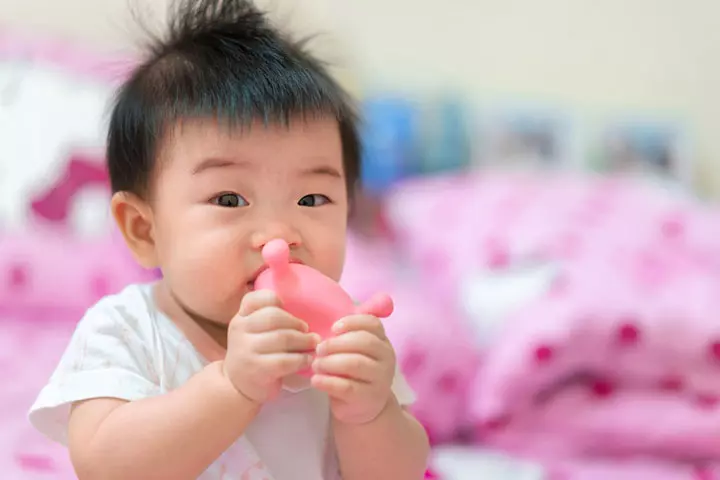
4. Redirect their behavior
Make sure you do not shout or punish them for such behavior because it might give them attention and provoke them to do it more often. Instead, focus on toddler self-soothing techniques like distracting them by redirecting their attention towards something interesting, giving them their favorite toy, comforting them, or taking them outdoors for a while. Running or playing outdoors is an excellent way for toddlers to expend their excess energy. It may allow them to recenter their focus on communicating their needs and expressing their emotions better (5).
5. Use visual aids
Children may connect better when taught using images and diagrams. Introduce visual tools like emotion charts and communication boards to help your toddler recognize and express their feelings. These tools display different emotions, helping your toddler navigate their feelings. Also, children may become more inclined to share their emotions rather than resort to self-harming behaviors. This approach can be especially effective for younger children who struggle with emotional regulation (8).
Is A Toddler Hitting Themselves A Sign Of Autism?
Hitting oneself is not an exclusive indicator of autism or autism spectrum disorder (ASD) in a toddler. Toddlers with autism show several other signs, along with hitting themselves. Those with autism tend to hit themselves in a particular pattern or maintain a certain rhythm, which may not be present in toddlers with no autism.
Studies on children with autism spectrum disorder indicated that close to 18.3 percent engaged in some form of self-injurious behavior such as eye poking, self-hitting, and head banging (12).
Toddlers with autism also tend to hit themselves without any discernible trigger to those around them, and the hitting can often last for several minutes. During the hitting episode, a toddler with autism may not react to parents’ instructions or may not respond to their name, continuing with hitting while seeming disconnected from their surroundings.
If you sense your toddler could be hitting themselves due to autism and has shown other alarming or concerning behavioral signs, consult a healthcare provider specializing in diagnosing autism in children.
Treatment For SBI In Children With Autism
According to the Autism Research Institute, treatment for SBI in toddlers with autism usually includes (9):
- Helping them communicate their needs either verbally or with sign language.
- Removing triggers that cause excessive sensory arousal or induce social anxiety.
- Teaching ways to distract themselves when overstimulated.
- Reinforcing the toddler whenever they communicate appropriately.
- Seeking help for addressing underlying psychological comorbidities.
- Providing behavioral interventions to reform self-injurious habits.
- Providing timely medical intervention to address physical ailments.
When Is It A Concern?

Although SIB is common among toddlers, it could sometimes indicate an underlying medical or psychological condition If your child’s SIB persists even after five years of age, it might be a sign of developmental disabilities (1).
If your toddler hits themselves or bangs their head often for no specific reason, it is best to observe the behavior and report it to your pediatrician. Noting down the time, frequency, and the child’s behavior may help you explain the condition better.
However, if your toddler hits themselves to grab your attention or to show their strong emotions, you need not worry, as it is just their way of getting along and understanding the world.
While toddlers learn to understand and express their emotions, be patient, give them time, and do not yell or shout at them. Also, make sure they do not hurt themselves and shower them with all the love they need.
 Quick fact
Quick factUnderstanding why toddlers hit themselves may help parents and caregivers take the necessary preventive measures. Many toddlers have self-injuring behaviors, which may be caused by frustration, anger, tiredness, or boredom. Loneliness and lack of attention can also trigger headbanging and similar reactions in toddlers. Some may also do it out of excitement, similar to clapping hands. Parents and caregivers should comfort and make the environment safe to prevent head injuries if the toddler has a habit of banging their head. Also, paying extra attention to the toddler may help them overcome their self-injuring behaviors.
Frequently Asked Questions
1. How long do toddlers hit themselves?
Most toddlers begin hitting and display tantrums by around one and a half years. This behavior usually resolves as they get better at expressing themselves or start speaking well by four (5).
2. Do all toddlers go through a hitting phase?
Mostly all toddlers may have displayed hitting behaviors or temper tantrums for various reasons, at least once under three years of age. Moreover, research findings suggest that temper tantrums could begin as early as a child touches the one-year mark and may peak at three years (10).
3. What should I not do when my toddler hits?
Apart from avoiding yelling and hitting your defiant toddler, it would be best to refrain from telling them how to feel, taking their behaviors personally, lying, or passing sarcastic comments to them (11).
Infographic: Risk Factors And Ways To Stop Toddlers From Hitting Themselves
Toddlers’ hitting and self-harming behaviors can sometimes lead to severe consequences. Therefore, it is crucial to understand what is causing such behaviors and how to prevent them from injuring themselves. Here is an infographic with the risk factors and ways to prevent toddlers from hitting themselves.
Some thing wrong with infographic shortcode. please verify shortcode syntax
Discover the perplexing reasons behind why your toddler is banging their head and other self harming behavior, explained by a professional.
Personal Experience: Source
MomJunction articles include first-hand experiences to provide you with better insights through real-life narratives. Here are the sources of personal accounts referenced in this article.
i. Why Is My Toddler Hitting Herself?;https://www.arosetintedworld.co.uk/why-is-my-toddler-hitting-herself/
References
- Patricia F. Kurtz, et al.; Identification of Emerging Self-Injurious Behavior in Young Children: A Preliminary Study; HHS Manuscripts (2013).
- Jane Summers, et al.; Self-Injury in Autism Spectrum Disorder and Intellectual Disability: Exploring the Role of Reactivity to Pain and Sensory Input; Brain Sciences (2017).
- Emotional Development: 2 Year Olds; American Academy of Pediatrics
- Head Banging and Body Rocking; Cleveland Clinic
- Disciplining Your Toddler; Nemours KidsHealth
- Temper tantrums; NHS
- Babies and Head Banging at Night; Sleep Foundation
- Navigating Tantrums and Meltdowns: Strategies for Parents and Caregivers; School Avoidance Alliance
- Causes and Interventions for Self-Injury in Autism; Autism Research Institute.
- Sisterhen LL and Wy PAW; Temper Tantrums; NCBI
- What NOT to Do When Your Child Is Having a Tantrum; The Child Mind Institute
- Noha F Minshawi et al.;The association between self-injurious behaviors and autism spectrum disorders; NCBI
Community Experiences
Join the conversation and become a part of our nurturing community! Share your stories, experiences, and insights to connect with fellow parents.
Read full bio of Pranjul Tandon
- Dr. Raashid Hamid is a consultant in the department of Pediatric Surgery at GMC hospital and associate professor of Pediatric and Neonatal Surgery at SKIMS, Jammu & Kashmir, India. He has four years of experience and specializes in general surgeries, including appendectomy, cholecystectomy, and exploratory laparotomy.
 Dr. Raashid Hamid is a consultant in the department of Pediatric Surgery at GMC hospital and associate professor of Pediatric and Neonatal Surgery at SKIMS, Jammu & Kashmir, India. He has four years of experience and specializes in general surgeries, including appendectomy, cholecystectomy, and exploratory laparotomy.
Dr. Raashid Hamid is a consultant in the department of Pediatric Surgery at GMC hospital and associate professor of Pediatric and Neonatal Surgery at SKIMS, Jammu & Kashmir, India. He has four years of experience and specializes in general surgeries, including appendectomy, cholecystectomy, and exploratory laparotomy. - Dr. Maria Carmela Villania-Mamauag is a board certified diplomate of the Philippine Pediatric Society with a degree of Doctor of Medicine from Our Lady of Fatima University, Valenzuela City and a Bachelor in Science in Psychology from Saint Louis University, Baguio City which was augmented by a year of Bachelor in Science in Family Life and Child development at the University of the Philippines, Diliman, Quezon City.
 Dr. Maria Carmela Villania-Mamauag is a board certified diplomate of the Philippine Pediatric Society with a degree of Doctor of Medicine from Our Lady of Fatima University, Valenzuela City and a Bachelor in Science in Psychology from Saint Louis University, Baguio City which was augmented by a year of Bachelor in Science in Family Life and Child development at the University of the Philippines, Diliman, Quezon City.
Dr. Maria Carmela Villania-Mamauag is a board certified diplomate of the Philippine Pediatric Society with a degree of Doctor of Medicine from Our Lady of Fatima University, Valenzuela City and a Bachelor in Science in Psychology from Saint Louis University, Baguio City which was augmented by a year of Bachelor in Science in Family Life and Child development at the University of the Philippines, Diliman, Quezon City. - Maria Pistorio specializes in EMDR, Cognitive Behavioral Therapy (CBT), and Parent-Child Interaction Therapy (PCIT). She sees clients in Pennsylvania at her office and in Pennsylvania and Florida via telehealth. Maria is a Licensed Professional Counselor (LPC), Nationally Certified Counselor (NCC), certified in PCIT, and certified in CBT by the Philadelphia College of Osteopathic Medicine.
 Maria Pistorio specializes in EMDR, Cognitive Behavioral Therapy (CBT), and Parent-Child Interaction Therapy (PCIT). She sees clients in Pennsylvania at her office and in Pennsylvania and Florida via telehealth. Maria is a Licensed Professional Counselor (LPC), Nationally Certified Counselor (NCC), certified in PCIT, and certified in CBT by the Philadelphia College of Osteopathic Medicine.
Maria Pistorio specializes in EMDR, Cognitive Behavioral Therapy (CBT), and Parent-Child Interaction Therapy (PCIT). She sees clients in Pennsylvania at her office and in Pennsylvania and Florida via telehealth. Maria is a Licensed Professional Counselor (LPC), Nationally Certified Counselor (NCC), certified in PCIT, and certified in CBT by the Philadelphia College of Osteopathic Medicine.
Read full bio of Rohit Garoo
Read full bio of Dr. Ritika Shah
Read full bio of Apoorva K








